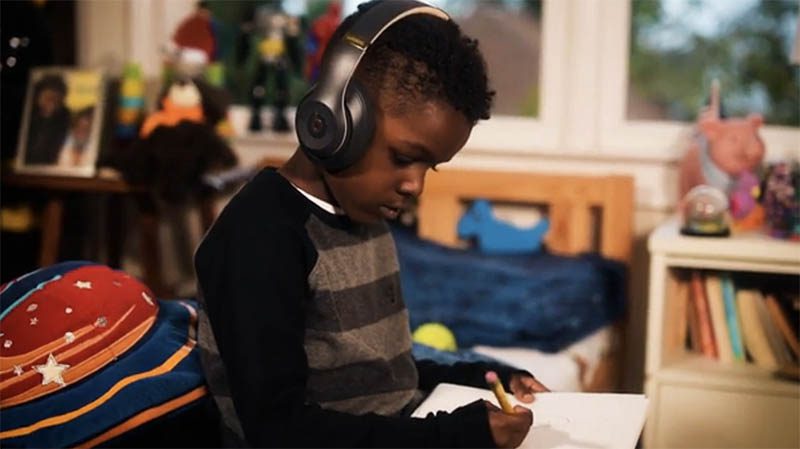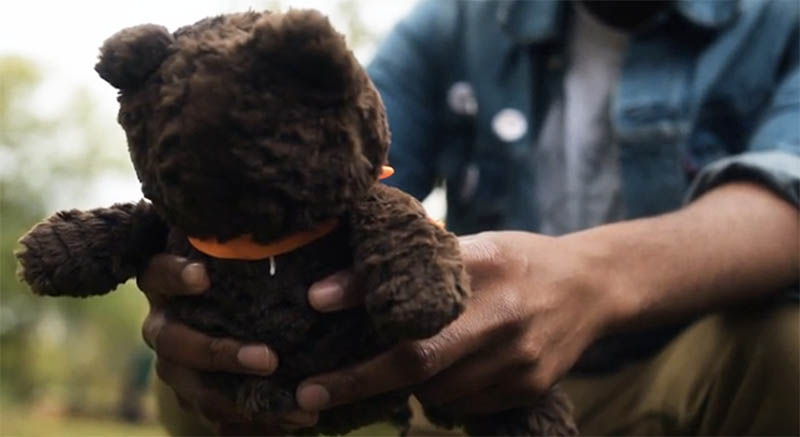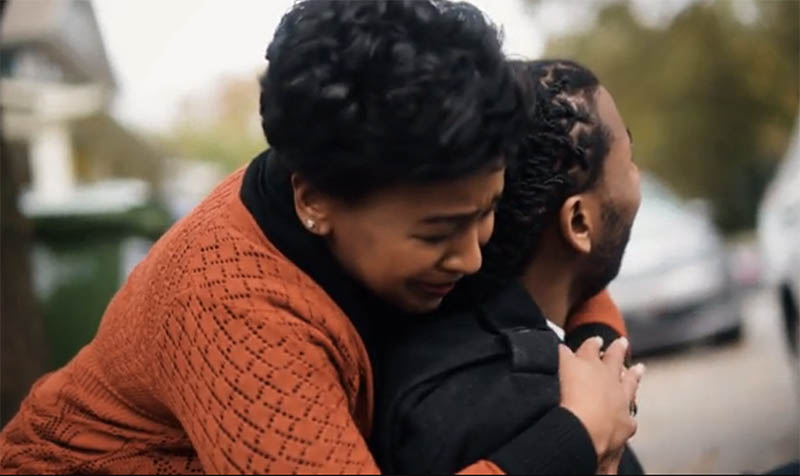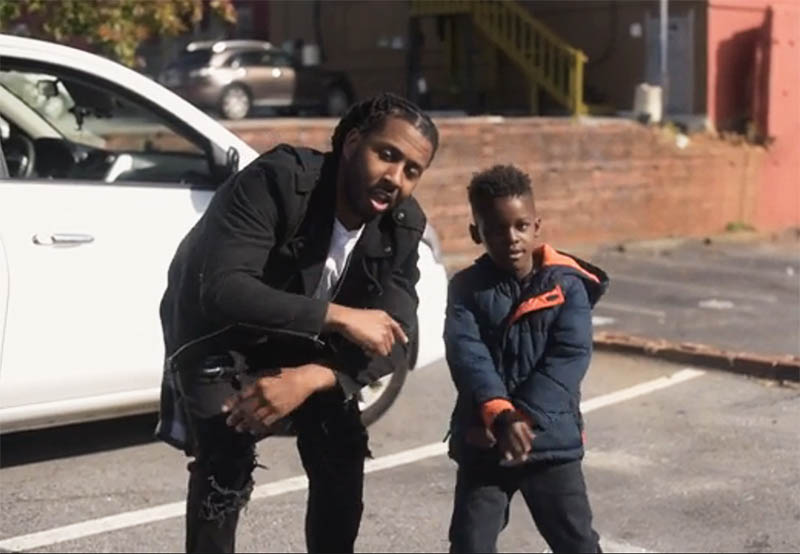A Conversation With Duran Jones About How He Overcame Fear Through Writing “BLKMGC”

Jahlil Muhammad stars in “BLKMGC”
Written by Duran Jones and directed by Shaun Mathis, BLKMGC is a short film that beautifully combines Duran’s music alongside a powerful and emotionally gripping story that is deeply relevant to the times. It follows a young father (Duran Jones) struggling to chase his dreams as an artist while raising his young son (Jahlil Muhammad), and how a senseless tragedy causes him to question his faith and conviction.
As the second place winner of the Jaro PVIFF Short Film Competition, we sat down with Duran to learn more about the compelling short, the inspiration behind it, and how he overcame his own personal fears of fatherhood and more through the art of writing and music.
Tell us more about your inspiration for the film.
The film uses the Tamir Rice situation, and pulls inspiration from that. One of my first break out projects that I became known for was “Skittles in Arizona,” which is a Trayvon Martin tribute song. I got really, really into that cause, into that social justice movement. So everything that I’ve done has come around that.
The storyline for the film comes out of my fear of having a child while I’m trying to chase and obtain my dream. It comes from if that were to happen to me, would I have enough time to give to both, or would I be able to split that time? Because I never want to be a father that says, “Hey, you can do whatever you dream of,” and I never do it for myself. So I think that’s where the storyline came for me. Typically, I write all of my music videos, and I sat down to make one music video, and ended up making a film using all five songs. I don’t know where it came from, but it was some kind of divine intervention that made me sit and write it.
While working with Shaun, who’s the director of the film, he actually has a 10-year-old daughter and a newborn son. I can see how that works for him. His daughter comes to set, she comes to film festivals with us. He actively has her with him so she can see what it takes. Out of that fear, I’ve been able to use him as a catalyst to figure out if that were to happen in my life, how to make it work.
How did you link up with Shaun?
Me and Shaun met five years ago at a performance I was doing. We followed each other on Instagram, and never linked up for five years. I wrote this script, and on Instagram I saw all the films he was doing, and I just reached out to him. Like, “Hey, I got this idea. I’ve never done a film, I don’t even know where to start.” He’s like, “Cool, let’s meet at Starbucks.” I pitched him the idea by telling him the storyline and playing him the music so he would get it, and he was like, “We gotta do it.” And from there, it took about six months before we actually got a chance to shoot it. We planned for about three weeks, but it took us a total of six months to get everything done.
How long did it take for you to write the story and write the music?
The music I made over the course of about one and a half, two years. And for me, the storyline was about six hours. It didn’t take much at all because, like I said, I was sitting down writing music videos. My format is to have my lyrics on one side and to do the shots that I want to see on the other. And then from that, I just kept seeing this story, and it just rolled from one song to another. This is a film, not a music video, or a series of music videos. There’s no way for me to do it any other way.
That sounds unique. So whenever you write music, you also think about the visual aspect of it?
Yeah. it’s a gift and a curse, because i was a broadcast journalism major in school. So it’s broadcast journalism format. On the left side, you have whatever’s written or said by the anchor or reporter, and then on the right side you have the clips that you want to see. So instead of doing clips, I just do my actual story in the shots. So it’s like a close up of me walking out of the prison, or a close up of my son’s teddy bear. And I can just write it that way. So when I give it to somebody like Shawn, a director, he’s like, “Oh, I see exactly what the story is,” without me having to do the dialogue format and taking extra classes, spending $25,000 a year to go to school again.

Having this setup where you always think about the visual, how do you think that influences your music?
I think that’s like a what comes first, the chicken or the egg kind of thing. For this one, the music came first. I don’t know if the music spawned the visuals, or if the things that I saw in my life or things that were happening around me spawned the music. I can’t really say, but I know they both work together.
BLKMGC appears to be in a category all to itself. It’s not your traditional short, more of a musical. Was that your intention?
No, that was not my intention. But when I sat down and we watched in post-production, we were like, this is an urban musical minus the dancing and the random breaking into song. It’s songs used to illustrate the story, but the story still being our story, and not being hijacked by a third party. I don’t know if there’s a short film musical category or an experimental short film. I just wrote a story, and tried to get it created. It’s not like the rest of the short films, so when you do get to that music portion and it does break out, you’re like, “I thought I was watching a short. This is a music video.” And if you don’t continue watching, then you’ve missed the entire purpose of everything that we did. It’s much like we were talking about with the youth. If you continue to sit and listen, then over time you’ll start to understand it more.
What were some of the most challenging and rewarding aspects about bringing BLKMGC to life?
I think the most challenging and the most rewarding was the budget. Shaun and his team really looked out for me because they really liked the project that I pitched them, but there was still some funding that needed to be done. As an artist, I like to be able to create, but I hate to ask people for money. So I had to get over that fear, and getting over that fear allowed me to break into a community of people who were willing to give, because they had seen what all of us had done separately before. We did an entire Kickstarter campaign for it, and that’s how we raised all of the money to do the film. That community got different incentives; there’s a whole list of people in my thank you’s at the end of the credits, and they’re all donors. We gave them T-shirts, merchandise, we used images of what they thought BLK MGC represented to market on social media. Bringing that community together really meant the most to me out of everything, because I’ve never had that with any other project. Sometimes as a creative, you feel like you’re creating in a box, in a bubble. It’s like, this is mine. But this one was for everybody.
What was it like working with child actor Jahlil Muhammad?
He is a star. He actually plays Mack Wilds’ son on “Shots Fired.” Jahlil is a special kid. When we shot the scene at the playground, there were other little kids at the playground. He played with them for a little bit, but when we came up with the cameras, one little boy came up and said, “Hey, you want to come with us on the basketball court?” And he said, “Not right now, I’m acting.” I was like, yeah, he’s way more serious than I am. Very professional.
I was reading the backstory, and I found that to be exceptional because it’s sharing a more personal story. Tell us how that has really helped you in this.
The story is about my brother, my step-brother. He is currently serving a 36 year sentence in prison for a homicide. He has four children, and I don’t have a connection with all of them, but his first born, I have most of a connection with. In the beginning of the film, you hear somebody talking on the phone with me, and that’s him. So it’s a clip from my first conversation with him, the first time I talked to him while he’s incarcerated, and just the words of wisdom that he shared with me, and it’s sprinkled throughout the EP as well. It’s interesting to me because it took him to be sent down for that amount of time to develop and grow into the person that we all saw him as anyway. He was always a natural born leader, but he spent a lot of time trying to follow. And he paid the price for it. It’s hard for me to see his story, be the child of a mother who had him when she was 18, and then not have that fear in the back of my mind. Like, would I be able to live up to everything that my mom provided for me, or would I suffer kind of like the brother that I have? All of that works in, that’s why I said it’s so hard for me to figure out which one came first, the visuals or the music, because they all play together.
You’ve mentioned fear on three different occasions. Fear of being able to balance your dreams with potential fatherhood, fear of not following in the footsteps that your parents have set up, and fear of the youth, as depicted in the film, being murdered by police officers.
Fear is an interesting thing to me. I subscribe to the thought that no fear is really real. Danger is real, but fear itself is just a fear of what could happen, what the outcome could be. So me talking about it diminishes my actual fear of it. If it were to happen, then it would just happen, and I would have to react accordingly. But me fearing it is illogical because it hasn’t happened. How can something that’s not in front of me affect me? So I think me addressing it in music and art in general is just a way for me to overcome it.

How can you use your art to show them that the fear can be overcome, and use your message to keep young people from turning bad circumstances into hate? Do you think you have a responsibility to help do that?
I absolutely do. I think each of us has that opportunity to a generation that comes behind us, to share whatever wisdom that we have. But I think it has to be a constant reminder that these things aren’t new, and that you’re not the only one experiencing it. A lot of times, we get into the mental health portion of the discussion from all the trauma that we receive as African Americans in this country, and we don’t get a chance to deal with it. I spoke to a group of creatives a couple of weeks ago, and we were talking about mental health in the creative market. A lot of actors, writers, or musicians commit suicide because they deal with depression, anxiety, and all these other things.
But in our community for so long, because we haven’t had adequate health care, we’ve used music and creativity as an outlet or a substitute for getting the proper help. And a lot of times, it becomes a pattern of us sharing our trauma in order to get a profit. I don’t want to get in the habit of sharing the trauma, but at the same time I have to give them the truth, because even though they’re young and they don’t have the same experiences as we do, they still know when something is fake. So my goal is to just give them as much truth and honesty as possible, even if my parents or grandparents may not agree with all of the language, but I know they’ll understand. Because I’m not talking to my parents or my grandparents, I’m talking to them. So my language has to be in my form of what a parable would be.
Sometimes using curse words are the only words that fit the emotion that I want to describe. And if you hear it and it pierces you, it’s because I meant for it to. It’s not using them in a way that’s frivolous and just throwing them out there, but at the same time, I want it to impact you in the way that whatever event I’m describing impacted me. We get into a habit of sometimes judging the language–Tupac ran into that situation a lot–but we don’t look at the content. These four letter words are what he uses to express himself in order for people to understand the emotion behind it. I can’t just say that I’m mad the police killed somebody. If I say, “This is fucked up,” you understand in an entirely different way. We have to be able to get past the use of words, because words are just words.
What’s next for you?
Continuing to push forward and getting more into creating television and film. Shaun and I are actually writing a TV series now where we’re bridging the gap between television and also the music that I create. So the music will serve as the soundtrack and the backdrop for this TV series. We’re going to be working on pitching that to different networks, just so they can see the value in black creatives. This is a Sci-Fi show. There’s not many black Sci-Fi shows on TV or film, but it’s a part of the culture. We’re represented when we buy tickets, but we’re not represented when we look at the screen, so we want to change that. And just continuing to develop my acting, and get out there and meet people like you all.
What are some of the themes of the Sci-Fi show?
It’s an age-old tale about vampires, but it deals with the origin. We always hear about vampires; in order for you to become a vampire, you have to be bit. But who bit the first vampire? Where did they come from, how did they develop? What made them go down this path–was it a gift, a curse, a mutation? So it deals with all those things, but brings it in the present day, and deals with the social justice aspects.
Continue to support Duran and his team’s journey by visiting their fundraiser for BLK MGC.
https://www.youtube.com/watch?v=fPpa2wvRJiY

No Comments